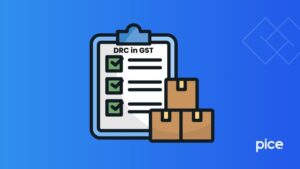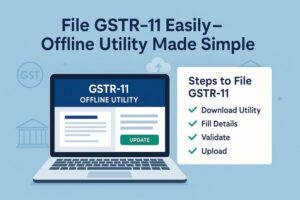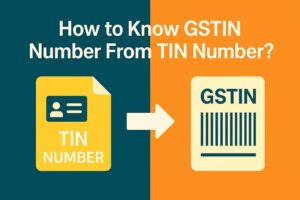How to calculate interest on GST allowed in income tax?
- 17 Aug 24
- 20 mins

How to calculate interest on GST allowed in income tax?
- What is Late Fees Under GST?
- Late Fees Under GST as per Latest Notification
- How to pay late fees in GST Portal?
- GST Payment Due Dates for Both General & Composition Scheme Taxpayers
- How to calculate interest under GST?
- Penalty on Missing the GST Due Date
- Reduction Under the Latest Amendments
- Rules and Regulations of GST Payment for Taxpayers
- Conclusion
Key Takeaways
- Timely Filing Encouraged: Late fees in GST are designed to incentivize timely filing of returns to ensure smooth tax administration.
- Waivers Possible: Authorities may waive late fees in certain situations, like technical glitches on the GST portal.
- Variable Fees: Late fees vary between regular taxpayers and those enrolled in the Composition Scheme.
- Updates as Needed: GST late fee rates are updated based on the decisions of the GST Council and are not on a fixed schedule.
GST (Goods and Services Tax) is a comprehensive, multi-stage, destination-based tax that is levied on every value addition. Understanding the nuances of GST, including late fees, is crucial for compliance and avoiding unnecessary penalties.
What is Late Fees Under GST?
Late fees under GST (Goods and Services Tax) are financial penalties imposed on businesses for the late filing of GST returns. These fees are designed to encourage timely compliance with tax filing obligations. The structure of late fees varies based on whether there is any tax liability outstanding and the type of GST return being filed.

The central tenet of GST late fees is to enforce discipline among taxpayers, ensuring that tax returns are filed on time to maintain a consistent and reliable flow of tax revenues, which is crucial for the government's budgeting and spending. Late fees are calculated per day of delay and are subject to a maximum cap to avoid excessive penalties that could be financially debilitating to businesses, especially smaller ones.
For instance, if a business fails to file the monthly GST returns on time, it may incur a late fee of ₹50 per day (₹25 per day for nil returns) up to a maximum limit. This fee applies from the day after the due date until the date the return is actually filed. The GST portal automatically calculates this fee based on the number of days late and adds it to the taxpayer's liability when they file their return.
Late Fees Under GST as per Latest Notification
As per the latest notifications regarding GST (Goods and Services Tax) in India, the late fees have been updated to ease the burden on small businesses while ensuring compliance from all sectors. These changes reflect the GST Council's ongoing efforts to streamline tax administration and improve taxpayer compliance.
- Nature of Penalty
Late fees under GST are imposed as a penalty for the late filing of returns. This penalty is designed to encourage timely compliance with filing requirements. The nature of this penalty is more administrative than punitive, aiming to push taxpayers towards adherence to the due dates set by the tax authorities.
- Filing of Returns
All GST-registered businesses are required to file returns periodically. The filing frequencies are monthly, quarterly, or annually, depending on the business type and the scheme under which the taxpayer is registered. Late filing results in a penalty, unless waived under specific circumstances by the authorities.
- Fees of GST Return
The late fee for filing a GST return past the due date is currently set at ₹50 per day for taxpayers with tax liability and ₹20 per day (each for CGST and SGST) for those without any tax liability. However, there is a cap to prevent excessive penalties, with a maximum of ₹5000 per return.
- Tax Payments
The late fees are in addition to any interest on late tax payments, which is calculated at 18% per year. This interest is computed from the due date of payment to the date when the payment is actually made.
- Income Chargeable
Under GST, the income chargeable is the total taxable revenue minus any allowable deductions, such as input tax credits. Late payment fees and penalties do not constitute deductible expenses and, as such, add to the financial burden of the taxpayer.
- Taxable Income
For GST purposes, taxable income is the total value of sales subject to GST after deductions for returns and discounts. Filing GST returns late does not affect the calculation of taxable income but impacts the compliance rating and incurs additional costs through late fees.
- Computation of Income
The computation of income for GST purposes involves accounting for all taxable supplies made during the period. Late filings complicate this process, potentially leading to rushed submissions and errors, which can further complicate compliance and financial reporting.
- Electronic Credit Ledger
The electronic credit ledger on the GST portal records the input tax credit available to a taxpayer. Late filings can delay the reconciliation of this ledger, affecting the taxpayer’s ability to utilize the credits to offset future liabilities.
- Input Service Distributor
An Input Service Distributor (ISD) under GST is responsible for distributing the tax credit on services to the branches of a company. Late filings by an ISD can delay the distribution of credits, affecting the cash flows of linked units.
- Late Fee Waiver
In some instances, such as during the COVID-19 pandemic, the GST Council has provided late fee waivers to alleviate the challenges faced by businesses. These waivers are usually announced via notifications and are applicable for a specified period.
Up-to-Date List of Late Fee Notifications

To help you stay compliant and avoid unnecessary penalties under the Goods and Services Tax (GST) in India, here is an up-to-date list of the most recent late fee notifications issued by the GST Council:
- June 2021 Notification
As a relief measure due to the COVID-19 pandemic, the GST Council reduced late fees for certain taxpayers. Small taxpayers (those with a turnover up to Rs. 1.5 crore) filing monthly returns can now be charged a maximum late fee of Rs. 1,000 (Rs. 500 each for CGST and SGST) per return.
For nil returns, the maximum late fee is Rs. 500 per return (Rs. 250 each for CGST and SGST).
- December 2020 Notification
The GST Council announced a cap on the maximum late fee for GSTR-3B filings to aid compliance. The cap was set at Rs. 5,000 per return for taxpayers with tax liabilities for the tax period.
For non-filers, the late fee was capped at Rs. 500 per return.
- August 2020 Notification
In this notification, the GST Council specified a reduced late fee for delayed filing of the annual returns (GSTR-9 and GSTR-9C) for the fiscal years 2017-18 and 2018-19. This was a one-time measure to facilitate the completion of backlogs in filing.
- March 2020 Notification
As part of COVID-19 relief measures, the late fee for not filing GSTR-1, GSTR-3B, and GSTR-4 by the due dates was waived, provided the returns were filed by specified dates in June 2020.
- September 2019 Notification
The GST Council revised the structure of late fees for the simplified return system, aiming to ease the burden on small and medium-sized enterprises (SMEs). Late fees were rationalized based on turnover and the delay in the number of days past the deadline.
- June 2019 Notification
A significant decision was made to waive the late fee completely for all taxpayers who failed to file GSTR-1 (monthly or quarterly) from July 2017 to November 2019, provided the returns were filed before a specified date in December 2019.
- May 2018 Notification
The Council provided relief by capping the late fee for GSTR-3B to a maximum of Rs. 500 per return for nil filers. This was intended to alleviate the compliance burden on businesses with no tax liability during the period.
How to pay late fees in GST Portal?
Paying late fees through the GST portal is a straightforward process that is integrated into the regular return filing procedure. Here’s a step-by-step guide on how to pay late fees through the GST portal:
Step 1: Log in to the GST Portal
Start by visiting the official GST portal at www.gst.gov.in. Enter your username and password to log into your GST account.
Step 2: Go to the Returns Dashboard
Once logged in, navigate to the 'Services' menu. Under this, you will find the 'Returns' option. Click on it to open the Returns Dashboard, where you can see all pending actions regarding your GST filings.
Step 3: Select the Return Filing Period
In the Returns Dashboard, select the financial year and the return filing period (month or quarter) for which you need to file the return. This is the return for which the late fee is applicable if you have missed the original due date.
Step 4: Prepare the Return
Click on ‘Prepare Online’ or ‘Prepare Offline’ depending on your preference for filling out the return form. Enter all necessary details into the return form as required.
Step 5: Late Fee Calculation
The GST portal automatically calculates any late fees applicable based on the number of days you are late in filing your return. This calculation is shown in the liability ledger. You do not need to manually calculate the late fee.
Step 5: Check the Late Fee Amount
Review the calculated late fee that appears automatically in the liability section of your return. Make sure the details and the amount of the late fee are correct as per the current rules.
Step 6: Make Payment
Proceed to make the payment of the late fee along with any other tax liabilities. You can pay using the balance available in your electronic cash ledger or through other payment methods like net banking, NEFT, or RTGS.
Step 7: File the Return
After payment, confirm all the details entered in the return are correct. Submit the return by clicking the ‘Submit’ button. You might need to authenticate the filing with an Electronic Verification Code (EVC) or a Digital Signature Certificate (DSC), depending on the type of taxpayer you are.
Step 8: Acknowledgment
Once the return is filed and the late fee is paid, you will receive an acknowledgment on your registered email and mobile number. You can also download the acknowledgment receipt from the portal for your records.
Step 9: Check the updated ledger
After filing, you can check your electronic liability ledger to ensure that the late fee payment has been recorded and the ledger is updated.
GST Payment Due Dates for Both General & Composition Scheme Taxpayers

The GST payment due dates are crucial for all taxpayers registered under the Goods and Services Tax (GST) framework in India. These due dates vary depending on whether you are registered under the General Scheme or the Composition Scheme.
Here are the specifics for each:
General Scheme Taxpayers
For taxpayers under the General Scheme, which typically includes most businesses that exceed the turnover threshold for the Composition Scheme, the due dates are as follows:
- GST Return for Sales (GSTR-1): This is due on the 11th day of the month following the month for which the return is being filed. For instance, the GSTR-1 for sales made in January is due on the 11th of February.
- GST Return for Purchases (GSTR-2): As of now, the filing of GSTR-2 has been suspended.
- Summary Return (GSTR-3B): This return summarizes the details of GST liabilities and credits for a particular month. The due date for GSTR-3B is the 20th of the month following the month for which the return is filed. For instance, the deadline to submit the January return is February 20.
Composition Scheme Taxpayers
The Composition Scheme is designed for small businesses with a turnover of up to ₹1.5 crores (₹75 lakhs for special category states). This scheme simplifies GST compliance by reducing paperwork and compliance costs. Here are the payment due dates for Composition Scheme taxpayers:
- Quarterly Return (GSTR-4): Taxpayers under the Composition Scheme are required to file GSTR-4 every quarter. The due date for GSTR-4 is the 18th of the month following the quarter's end. For example, for the July–September quarter, the return is due by the 18th of October.
- Annual Return (GSTR-9A): This annual return is due by the 31st of December of the year following the fiscal year being reported. For instance, for the fiscal year 2023-2024, GSTR-9A is due by December 31, 2024.
Additional Considerations
- Annual Return (GSTR-9): For taxpayers not under the Composition Scheme, the annual return GSTR-9 is due by the 31st of December following the end of the fiscal year.
- Reconciliation Statement (GSTR-9C): A certified professional must prepare a reconciliation statement for taxpayers whose annual revenue exceeds Rs 2 crore. The due date for GSTR-9C aligns with the annual return and is also the 31st of December following the end of the fiscal year.
How to calculate interest under GST?
Calculating interest under GST (Goods and Services Tax) is an important aspect of compliance for taxpayers in India who have delayed their tax payments. Interest is charged when there is a delay in payment of tax due on the supplies made during a month and is applicable from the day following the due date of payment until the date the payment is actually made. Here’s how to calculate interest under GST:
Steps to Calculate Interest Under GST
- Step 1: Determine the Delayed Payment Amount: First, identify the amount of GST that was due but not paid by the due date. This amount will be the basis for calculating the interest.
- Step 2: Identify the Rate of Interest: The GST law specifies different rates of interest for different situations:
- Step 3: For late payment of tax, the interest rate is usually 18% per annum.
For undue or excess claims of input tax credit (ITC) or undue or excess reductions in output tax liability: The interest rate is usually 24% per year. - Step 4: Calculate the Number of Days of Delay: Count the number of days from the day immediately following the due date until the date when the payment is made. Perform the Interest Calculation: The formula to calculate interest is:
Interest = (Amount of delayed payment × Rate of interest × Number of days of delay) / 365
This formula uses 365 days, irrespective of whether the year is a leap year.
Penalty on Missing the GST Due Date
Late fees are the immediate penalty imposed for failing to file GST returns on time. These fees are calculated per day of delay and vary depending on the type of return:
- For GSTR-1 (sales return): If you miss filing this return, a late fee of ₹200 per day (₹100 under CGST + ₹100 under SGST) is charged, capped to a maximum of ₹5,000.
- For GSTR-3B (summary return): The late fee is ₹50 per day (₹25 under CGST + ₹25 under SGST) if there is tax liability, and ₹20 per day (₹10 under CGST + ₹10 under SGST) for nil returns, with no upper limit.
- For Annual Returns (GSTR-9): A late fee of ₹200 per day (₹100 under CGST + ₹100 under SGST) applies, up to a maximum of 0.25% of the taxpayer's annual turnover in the relevant state or union territory.
Interest on Late Payment
Interest is charged if there is a delay in payment of tax due. The rate of interest is typically:
18% per year for delay in payment of tax.
24% per annum for excess or undue claims of Input Tax Credit (ITC) or if the output tax liability is reduced erroneously.
The interest is calculated from the day after the due date until the date of payment, based on the outstanding tax amount.
Penalties for Not Filing Returns
In addition to late fees, if you fail to file your GST returns for a month, quarter, or year, further penalties might apply:
General penalty provisions: If a taxpayer fails to comply with the prescribed GST laws or requirements, a penalty can be imposed up to ₹25,000.
Steps to Mitigate Penalties
- Step 1: File as soon as possible. Even if you have missed a deadline, file your returns as soon as possible to stop the further accumulation of late fees and interest.
- Step 2: Voluntary compliance: If you realize a mistake in your GST filings or payments, rectifying it voluntarily before any notice from the GST authorities can sometimes help reduce penalties.
- Step 3: Seek extensions: During periods of technical glitches in the GST portal or exceptional circumstances like natural disasters, the GST Council often extends due dates. Keeping informed about these extensions can help avoid penalties.
- Step 4: Consult a GST practitioner. If you're unsure about your GST compliance, consulting a GST practitioner can help you navigate the rules and avoid penalties.
Reduction Under the Latest Amendments
The latest amendments to the Goods and Services Tax (GST) laws have brought about several changes intended to simplify compliance, reduce the burden on small taxpayers, and encourage timely filings. These changes often include reductions in penalties and late fees for certain categories of taxpayers or for specific situations. Here’s an overview of some significant reductions under the recent GST amendments:
- Reduction in Late Fees
One of the major reliefs provided by recent amendments involves the reduction of late fees for the filing of GSTR-3B and GSTR-1.
- For GSTR-3B (Summary Return),
The late fee for taxpayers having nil tax liability has been reduced to ₹50 per day (₹25 CGST + ₹25 SGST) with a maximum cap of ₹500 per return. For taxpayers with a tax liability, the maximum late fee has been reduced to ₹1,000 per return (₹500 CGST + ₹500 SGST).
- For GSTR-1 (Monthly Return),
Similar reductions have been applied to encourage the timely filing of outward supply details.
Waiver of Late Fees for Certain Periods
During the COVID-19 pandemic, the GST Council approved several waivers of late fees to alleviate the financial stress on businesses. For example, late fees were waived for certain periods for delayed filings of GSTR-3B to help businesses recover from the economic disruption caused by the pandemic.
- Reduction in Interest Rates for Delayed Payments
The GST Council has also periodically adjusted the interest rates for delayed tax payments to lower the burden during specific periods.
- Reduced Interest Rate for Specified Periods
The interest rate for delayed GST payments was temporarily reduced for taxpayers with an aggregate turnover of less than ₹5 crore. During specified periods, the interest rate was reduced to 9% p.a. from the standard 18% p.a., provided the returns were filed within stipulated extended dates.
- Amnesty Scheme to Waive Late Fees
The GST Council introduced an amnesty scheme to waive late fees for pending returns. This was aimed at increasing GST compliance and allowing businesses to clear their backlog without the added burden of accumulated late fees.
- Amnesty Scheme for Pending Returns
Under the scheme, the late fee for non-furnishing of GSTR-3B for past periods was reduced significantly, depending on the tax period and the date of filing under the amnesty scheme.
- Simplification of Annual Return Filing
The requirement for filing annual returns (GSTR-9/9C) has been simplified for small taxpayers. Taxpayers with an aggregate annual turnover of up to ₹2 crore have been given the option to skip filing GSTR-9/9C for specific fiscal years, reducing compliance stress.
- Rationalization of GST Rates
While not directly related to penalties or late fees, the rationalization of GST rates on various goods and services also effectively reduces the tax burden on consumers and businesses, aiding in simpler compliance and fewer tax disputes.
Rules and Regulations of GST Payment for Taxpayers
The Goods and Services Tax (GST) system in India involves a comprehensive set of rules and regulations governing the payment processes for taxpayers. These rules are designed to standardize the procedures for tax collection, remittance, and compliance across all states and union territories. Here’s an overview of the key rules and regulations of GST payment that every taxpayer should be aware of:

GST Registration
- Threshold for Registration: Businesses with an annual turnover exceeding ₹40 lakhs (₹20 lakhs for special category states) are required to register for GST. Service providers need to register if their annual turnover exceeds ₹20 lakhs (₹10 lakhs for special category states).
- Voluntary Registration: Businesses below the threshold can choose to register voluntarily. This allows them to claim input tax credits.
GST Invoicing
- Invoice Issuance: GST-registered businesses must issue tax invoices for all taxable sales, showing the amount of GST charged. Invoices must be issued within a specific time frame—generally, within 30 days of supplying the goods or services.
- E-Invoicing: For businesses with a turnover above a certain limit (currently ₹50 crores), e-invoicing is mandatory. This involves the electronic generation and submission of invoices on the GST portal.
GST Returns
- Frequent Filing: GST returns typically need to be filed monthly (GSTR-1 and GSTR-3B) or quarterly (for those eligible under the QRMP scheme).
- Annual Returns: All GST-registered businesses are required to file an annual return (GSTR-9) and a reconciliation statement (GSTR-9C) if their turnover exceeds ₹2 crores during the fiscal year.
GST Payments
- Payment Due Dates: The due date for GST payments is typically the 20th of the month following the reporting month. For instance, the January GST is due by February 20th.
- Modes of Payment: Taxpayers can make GST payments online through the GST portal using internet banking, NEFT, or RTGS.
- Input Tax Credit (ITC): Businesses can claim ITC for the GST paid on their purchases, which can be used to offset their GST liabilities. However, ITC must be claimed within a specified period and is subject to conditions such as possession of a valid tax invoice and the supplier having deposited the GST.
GST Compliance
- Compliance Rating: The GST system includes a compliance rating mechanism where businesses are rated based on their promptness in filing returns and making payments. A higher compliance rating can benefit businesses in terms of gaining trust from potential clients and avoiding scrutiny from tax authorities.
- Interest and Penalties: Late payments of GST attract an interest rate of 18% per annum. Failure to comply with GST regulations can also result in penalties. These penalties could be specific to the type of non-compliance, such as non-filing of returns, incorrect invoicing, or not making the full tax payment.
- Amendments and Adjustments: Taxpayers can rectify errors in previously filed returns in subsequent tax periods. However, there are restrictions and time limits on these corrections.
Dispute Resolution and Appeals
- Dispute Resolution: The GST law provides mechanisms for resolving disputes arising out of tax administration issues. Taxpayers can approach the Authority for Advance Rulings (AAR) for decisions on specific tax matters.
- Appeals: Taxpayers have the right to appeal against decisions made by GST officers. Appeals can be filed with the GST appellate authority, and further appeals can be taken to the High Court and the Supreme Court if necessary.
Conclusion
Understanding and adhering to the rules concerning late fees in GST is crucial for all taxpayers. Staying informed about changes and deadlines helps avoid unnecessary penalties and ensures smooth tax operations.
💡If you want to pay GST dues on time with a credit card and experience the convenience and possibility of earning rewards on payments, then download the PICE business payment app now.
 By
By 

















